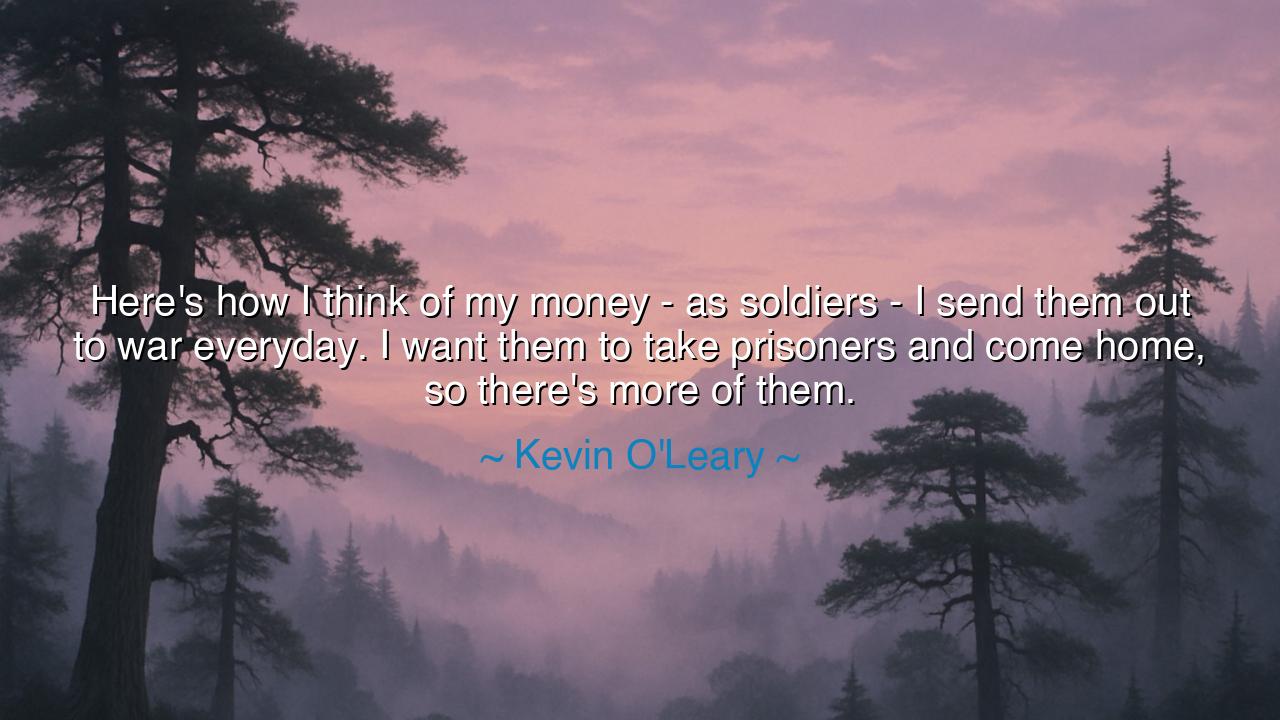
Here's how I think of my money - as soldiers - I send them out to
Here's how I think of my money - as soldiers - I send them out to war everyday. I want them to take prisoners and come home, so there's more of them.






In the striking and disciplined words of Kevin O’Leary, we hear the spirit of a warrior disguised as a businessman: “Here’s how I think of my money — as soldiers — I send them out to war every day. I want them to take prisoners and come home, so there’s more of them.” These words, though born in the modern battlefield of finance, carry the rhythm and philosophy of the ancients. For in them lies the eternal principle of strategy, discipline, and purposeful labor—that wealth, like power, is not something merely possessed, but something that must be directed with intention and courage.
To call one’s money soldiers is to see it not as idle treasure, but as active energy—a force to be deployed. This vision recalls the mindset of ancient generals and wise rulers who understood that victory was never the result of chance, but of careful preparation and the intelligent use of resources. O’Leary’s metaphor reminds us that each coin, each investment, is like a warrior under our command; and like any army, it requires a leader who is vigilant, disciplined, and free of emotion. Money, in his philosophy, is not a symbol of greed—it is an instrument of freedom and conquest, a means by which one may build, protect, and expand.
The ancients would have understood this well. Consider Cyrus the Great, the founder of the Persian Empire. He viewed his soldiers not as expendable tools, but as extensions of his will—each movement of his army, a reflection of his foresight. He never sent them into battle without purpose, and through strategy rather than sheer strength, he forged an empire that lasted generations. In the same way, O’Leary teaches that money should not be spent impulsively or squandered; it must be commanded. Each dollar must serve a goal, each investment a mission. Those who scatter their wealth without vision are like generals who send their troops into chaos—they lose both their fortune and their peace.
But O’Leary’s imagery goes beyond mere finance; it is also a lesson in mindset. The world often treats money with either fear or desire—two emotions that cloud judgment. The wise, however, treat it as a servant, not a master. When he says, “I want them to take prisoners and come home,” he speaks of the power of compounding, of making one’s wealth multiply through prudence and patience. Money that works for you—earning, investing, and returning—is the fruit of wisdom and restraint. The ancients would have called this “putting your talent to use,” echoing the parable of the servants who were entrusted with gold: the one who hid his share lost everything, but the one who grew it earned his master’s praise.
In a deeper sense, O’Leary’s words are also about legacy. Just as a wise ruler sends his warriors not to plunder, but to establish order and prosperity, so too must a wise person direct their wealth not merely for personal gain, but for enduring creation. Money, when commanded with virtue, builds schools, shelters, businesses, and dreams. It feeds the poor, funds innovation, and creates opportunity. Thus, the “returning soldiers” are not just more coins—they are the blessings of prosperity shared, the ripple of effort multiplied across generations.
The ancient Chinese strategist Sun Tzu, in The Art of War, taught that the victorious general wins before the battle is fought—he plans, positions, and commands with foresight. So too must one approach money. To send out your wealth without study, without understanding, is to send soldiers into the dark. But to plan—to learn the fields of investment, the patterns of growth, the risks of loss—is to command an army that brings victory home. O’Leary’s philosophy thus calls not for greed, but for discipline, study, and the mastery of self—for no general can win a war if he is conquered by his own impulses.
The lesson, then, is this: treat your resources—whether money, time, or energy—as soldiers in service of your greater purpose. Do not hoard them in fear, nor waste them in folly. Deploy them wisely, and let them return to you stronger than before. Learn the art of patience, of strategy, of mindful control. Let your money serve your life, not rule it. And when your “soldiers” return victorious, use their strength not merely to enrich yourself, but to build the world around you.
So, dear listener, remember the wisdom in Kevin O’Leary’s words: your money, like an army, reflects your command. If you lead it with discipline and clarity, it will conquer for you. If you lead it with fear or arrogance, it will scatter and be lost. Be both the warrior and the sage—bold in vision, but wise in judgment. For in the end, wealth is not merely in what you earn, but in how you direct the power entrusted to your hands.






AAdministratorAdministrator
Welcome, honored guests. Please leave a comment, we will respond soon